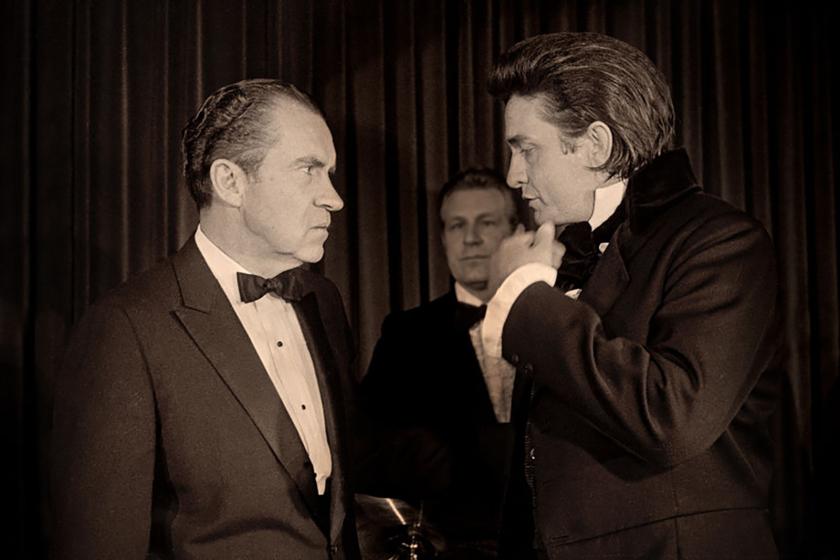Netflix’s ReMastered series is one of the streaming channel’s undersung gems. Launching in 2018, when Tricky Dick and the Man in Black first aired, it has proved to be a solidly well-made set of music documentaries. Some of its subjects have been raked over many times before, but the saga of President Richard Nixon inviting country superstar Johnny Cash to play the White House’s East Room (capacity 250) on April 17th 1970, while hardly obscure, is a lesser known event that proves fascinating.
The hour-long film quickly sets the scene, pinballing between Cash’s youth and his status in 1969 as a crossover country performer valued for his authenticity, even among elements of the rebellious young. The whole late-Sixties scenario is laid out quickly - counterculture vs establishment, Vietnam, long hair, Civil Rights, etc – and the film quickly moves to the meat of its tale. Directors Sara Dosa and the double Oscar-winning Barbara Kopple pull together an impressive array of interviewees to lay things out, including Cash’s siblings Joanne and Tommy, and Nixon aide Pat Buchanan.
The crux of it is that Nixon sees a parallel between himself and Cash, both self-made men who grew up poor in agricultural outbacks. He also sees winning over and retaining the “silent majority”, most especially the Godfearing south, as essential to his success. Having country music onside will be the key to this and we see footage of Nixon at Nasville’s Grand Ole Opry, telling an audience, “The peace of the world will depend not just on America’s military might, which is the greatest in the world, but it’s going to depend on our character, our love of our country, our willingness to not only wear the flag, but stand up for the flag, and country music does that.” Inviting Johnny Cash to the White House will, then, surely be Republican propaganda gold.
Cash, however, is not a simple man. He may be a patriot who respects the office of President, but, as the Sixties draw to a close, he’s heavily involved with Native Americans, enraged when the music business turns its back on his concept album, Bitter Tears, about their plight. He is at a peak of stardom fronting The Johnny Cash Show on television, a platform where he endorses Nixon - “My family stand behind the president and his quest for a just and lasting peace” – but he and wife June have also been to Vietnam to perform for the troops and he is clearly uncomfortable with what he’s seen.
The documentary compulsively sets the scene for a collision or cultures and moralities. It amps up the drama by focusing on Nixon’s ill-advised and publicly-made request that Cash play Merle Haggard’s reactionary anti-Sixties anthem “Okie From Muskogee” and the even more Daily Mail-style offensive “Welfare Cadillac”, and reveals the wily White House politics behind it all. As it turns out, the concert takes place the same day the crew of the troubled Apollo 13 space mission finally make it back to earth in one piece, which adds another layer of historical punch.
Cash prided himself on being the everyman, but sympathetic to those down-on-their-luck. During the late Sixties, as the documentary makes precisely clear, tightrope-walking between his southern heritage and his rising sympathy for righteous young Sixties causes, becomes almost impossible. How he stays true to all of himself while also giving Nixon pause for thought is the narrative culmination of the film and, although you can, of course, Google it, I’ll not spoil it here.
One last unlikely image also stays in the head after watching Tricky Dick and the Man in Black, not directly related to the events portray. Two years after Cash’s concert the ultra-easy listening Ray Conniff Singers played the White House. As they troop onto the stage, one of their ballgown-clad singers, Carole Feraci, pulls a cardboard sign from her clothing that reads, “STOP THE KILLING“, then takes to the microphone to announce, “President Nixon, stop bombing human beings, animals and vegetation. You go to church on Sundays and pray to Jesus Christ. If Jesus Christ were here tonight, you would not dare drop another bomb.” She is booed and hustled off. It is quite a thing.
By then Nixon was secretly annihilating Cambodia with bombs. Soon he would be mired in the Watergate Scandal that showed once and for all he was, indeed, “Tricky Dicky”. Johnny Cash attended one of the resultant trials, that of Bob Haldeman, a massive Cash fan who had been at the White House concert. Shamefaced Haldeman mouthed the words, “I’m sorry” to the Man in Black.
Below: Watch the trailer for Tricky Dicky and the Man in Black















Add comment